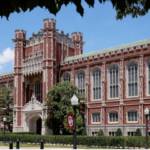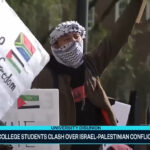Stripping Jews of their Self-Defense is What the U Illinois at Urbana-Champaign Divestment Vote is About

Led by the virulent anti-Israel, often anti-Semitic group Students for Justice in Palestine, the student government at the University of Illinois at Urbana-Champaign recently passed a resolution calling on the university to oppose anti-black racism and also to divest from Northrop Grumman, Raytheon Company, Lockheed Martin, Caterpillar Inc. and Elbit Systems Ltd., firms, the activists allege, that are “involved in human-rights violations and violations of international law, including the confiscation and destruction of Palestinian lands, criminalization of immigrants and communities of color, and other human rights violations,” offenses that would “make UIUC complicit in these crimes.”
Although this was the third time in four years the toxic Boycott, Divestment, and Sanctions (BDS) campaign has appeared on this campus, this permutation included, predictably, language on anti-black racism and police brutality. In fact, the anti-Israel portion of the resolution was furtively obscured by the language of racial equity, defunding law enforcement, and emptying prisons—even the absurd idea to defund the University’s own police department.
Conflating the alleged oppression of the Palestinians by the IDF with the oppression and racist treatment blacks in the United States purportedly experience at the hands of police officers, the resolution garnered support from those currently energized by the Black Lives Matter movement as well as those anti-Israel campus activists who promiscuously malign, slander, and libel the Jewish state.
For social justice warriors, to know one victim group is to know any victim group – with Israel being a tempting and habitual target of their opprobrium. Thus, for instance, supporters of the Black Lives Matter movement have often linked racism and police violence “from Ferguson to Palestine,” making Israel somehow complicit in American racism and police brutality, and even regularly suggest that Israel is practicing “apartheid” and is engaged in “genocide” against the Palestinians. The false charge that Israel practices apartheid, and therefore is a racist “regime,” frames the Israeli-Palestinian conflict in racial terms, and the Jewish state’s “colored” victims are analogous to the white supremacists of the United States who oppress and deprive human and civil rights to American blacks. This is the essence of intersectionality.
The UIU-C resolution presented a dilemma for Jewish students, of course. Not only was the resolution presented for a vote during the Jewish high holidays, so that many Jewish students were absent, but those pro-Israel students who would have normally denounced the resolution were torn between defeating an anti-Israel vote for divestment and, at the same time, wanting to support the portions of the resolution dealing with racial justice.
As is frequently the case when BDS resolutions are pushed through student governments, the discussion often glosses over, or ignores completely, the real problems of Palestinian culture, politics, and society (including its cult of death, terrorism, and martyrdom), and targets all criticism on Israel, Zionism, and Jewish power. All of the blame for the conflict is placed on the so-called occupation, the “apartheid wall,” Jewish “racism,” the oppression and militarism of the “Zionist regime,” and the brutal humiliation, collective punishment, and even “slow-moving” genocide Israel is said to mete out on a daily basis upon the wholly innocent Palestinians. This is a clear example of another underlying factor in the BDS campaign: the soft bigotry of low Palestinian expectations.
Methods have also been put into place by divestment proponents which help solidify the movement and enable campaigns on different campuses around the country to speak in a unified, consistent voice. One of these were detailed manuals, or guidebooks, written by individual BSD groups, but shared with others so that tactical approaches could be compared, built upon, and disseminated widely among those intent on weakening the Jewish state. One example, Fighting the New Apartheid: A Guide to Campus Divestment From Israel, written by Fayyad Sbaihat of the University of Wisconsin Divestment from Israel Campaign Project of Al-Awda Wisconsin, revealed the sinister rhetoric and execution of the divestment proponents. Its purpose, Sbaihat wrote, was “to provide a mechanism for sustaining momentum via continued connection and communication with divestment-active groups across the globe.”
To accomplish that, the guide suggested that “In order to be successful, the divestment from Israel campaign must focus on addressing the deep-rooted issues of Israel’s racism and ethno-religious centricity rather than debating facts on the ground that can prove illusive when one attempts to build a case around them,” particularly the type of “facts on the ground” such as those which recognize perennial Arab hostility to Jews and the state of Israel, homicidal terrorism committed by Palestinians against Israeli citizens, and the intractability of Palestinian leadership in entering into fruitful negotiations, accepting any peace settlements, or being reasonable about their list of demands.
That core sentiment has come to define the BDS movement, the notion that the repeated defamation of Israel will result in its eventual expulsion from the supposed civilized community of nations. But the call for divestment is merely a tactic through which Israel will be marginalized, and eventually extirpated, as a pariah state with no moral justification for existing. Thus, those pro-Palestinians, who give public expression to notions of “social justice” for everyone in the Middle East but actually mean justice for the Palestinians alone, and not to Israelis, admit, when pushed, that the sole underlying purpose of their calls for divestment is the eradication of Israel with a Palestine in its place.
UIU-C’s divestment resolution took a very targeted tact than earlier divestment campaigns at other universities: instead of calling for a complete divestment from any firms doing business with Israel, this resolution made, in their minds, an important distinction: only firms connected to the Israeli military would be targeted. The companies listed in the resolution are, according to the activist students who crafted it, involved in facilitating the ongoing military oppression of the Palestinians and supplying weaponry, surveillance equipment, and other hardware with which Israel is able to maintain its illegal occupation of Palestine.
Of course, no acknowledgement is forthcoming as to the reasons why the use of force against the civilian Palestinian population exists as part of daily life for Israeli citizens as well as Arab ones; that is, that Israel’s so-called “brutal occupation” and its military incursions were necessitated by Arab aggression and terrorism, and the use of force is not a random occurrence based on the whims of a sadistic Israeli military. In fact, by targeting firms which supply arms to Israel, this divestment effort was actually helping to achieve what Israel’s Arab foes have long-wanted, a militarily-weak Israel whose defenseless citizens could be massacred and, in the favorite exhortation of jihadist foes, “driven into the sea.” More ironically, the UIU-C divestment proponents fell into the morally-convenient trap which ascribed the root cause of terrorism not where it belongs—with the homicidal madmen who perpetrate it in the name of Allah and the desire to murder Jews—but once again to Israel, due to its very presence in the Levant.
At base of this particular resolution, one that seeks to weaken Israel’s defense by punishing the firms who supply it with military hardware, weaponry, and surveillance equipment. Israel-haters do this, purportedly, because they allege that Israel is an aggressive, militaristic entity that regularly and maliciously brutalizes wholly innocent Arab Palestinians in the Jewish state’s insatiable lust for territory and control. They denounce the existence of the “apartheid wall” and assert its illegality, conveniently overlooking the fact that the wall was built in the first place, not as a racist barrier to keep colored Arabs away from white Jewish neighborhoods, but as a necessary way of thwarting the terrorist attacks of genocidal psychopaths seeking to murder Jews. The fact that terrorist attacks, indeed, were reduced by some ninety percent after construction of the fence evidently escapes the notice of BDS supporters.
Sacrificing Jewish lives in the name of Palestinian self-determination actually has never seemed to have been a concern for the campus moral narcissists who promote divestment resolutions like this one, or who enthusiastically and very publicly chant “Intifada, intifada, long live the intifada” and “we support the intifada” at anti-Israel protests; in other words, extolling the decades-old homicidal rampage in Israel in which Arab terrorists have used explosives, knives, guns, stones, and vehicles to randomly murder Jewish civilians. In fact, the use of that word “intifada” is a grotesque and murderous reference to the Second Intifada that began in 2000, during which Arab terrorists murdered some 1000 Israelis and wounded more than 14,000 others.
The quandary that Jewish students found themselves facing with this resolution vote is one in which supporters of Israel continually find themselves. Since progressives have now put Zionism outside of the circle of acceptable ideology, those who support Israel but are also aligned with gay rights, anti-racism, women’s rights, and other liberal causes frequently are excluded from progressive campaigns.
“This is the dark side of the BDS intersectionality agenda,” observed Cary Nelson, professor emeritus of English and Jewish culture and society at ULU-C, in his book Israel Denial, discussing why, in the minds of their ideological opponents, Zionists often can no longer find a safe space in progressivism. “Zionist Jews do not ‘intersect’ with just causes. Zionists embody injustice no matter what issues are at stake. They contaminate and undermined every campaign for human rights. Zionists themselves are to be excluded, banished, boycotted, no matter who they are or where they live. Of course, we will be told this has nothing to do with anti-Semitism . . . .”
In its statement on the divestment vote, the University observed, correctly, that “it is unfortunate that a resolution before the group tonight was designed to force students who oppose efforts to divest from Israel to also vote against support for the Black Lives Matter movement.” On that point they were correct. And even more unfortunate is the fact that yet another campus campaign against Israel reveals that the effort to libel, slander, and weaken the Jewish state, while mendaciously positioned as a quest for social justice, includes a genocidal aspect that should worry us all.
Richard L. Cravatts, PhD, president emeritus of Scholars for Peace in the Middle East, is a Freedom Center Journalism Fellow in Academic Free Speech and the author of Dispatches From the Campus War Against Israel and Jews.




